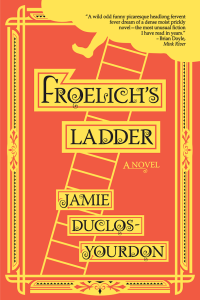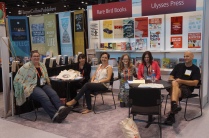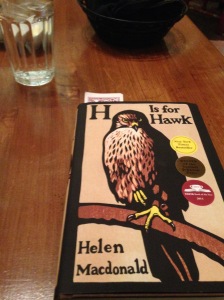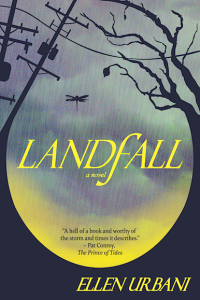We had more than a 300 percent increase in manuscripts in the first seven days of this year’s open submission period for Forest Avenue Press.
That’s certainly due to the national exposure the press has received this year, all the media coverage of Landfall by Ellen Urbani (in large part thanks to our publicist, Mary Bisbee-Beek), and also to being featured in the January/February issue of Poets & Writers.
Our open submission period runs through March 1.
In past years, when we’ve opened for acquisitions, I’ve really spent lots of time with the pages themselves, but this time, out of necessity caused by sheer volume, query letters count the most as I’m moving through the Submittable files. Some of our committee members prefer pages to queries, and that’s great, because it balances out my approach, but I’ve personally had to get faster at making decisions to not drown in the firehose stream of words heading into my inbox daily. After all, I have two ARCs in production for fall 2016, a book launching in March with a tour that’s getting organized, and assorted other obligations that erode my submission reading time. And I haven’t wanted to charge for submissions; that would, perhaps, be more practical, but I prefer keeping our door wide open to everyone.
Queries tell me about a writer; at this independent press level, we all have to work together quite closely for many years to come, and someone who comes off too demanding makes me wonder what that publisher-author relationship would be like. There’s an interesting line between sharing accomplishments as part of the bio and bragging about what you think your book might do in the marketplace. I’m all for market data and comp titles and endorsements, but I’m talking about the queries that talk about how incredible their own words are and how privileged the press would be to have this opportunity.
Personally I don’t care for queries that tell me how to feel about a story, or go too pointedly into the themes to the detriment of sharing the plot. The ones I like least? Letters that don’t say anything about the manuscript. Some of these are flippant–usually an immediate rejection–and some have lovely bios but don’t say enough about the story itself to give our committee a sense of where the book is going. Also, if the author can’t describe the book accurately, maybe it’s ill-formed, or never read by someone other than the author, or just not quite ready. Or maybe it’s a bear to try to describe, which means it’d be hard to sell to the sales reps, let alone booksellers and readers. Writers don’t want editors or agents to wonder any of these things, so do the work, write a solid description of your novel without being too coy, so we actually get a sense of where the story is going.
We’ve had a surprising number of query letters referring to the character’s quixotic journey. That phrase excited me at first–made me want to read more, made me feel like something fresh was coming–but now that I’m seeing it with frequency, it’s working against the submission. If you have a quixotic journey in your query letter, assuming agents and other publishers are getting a number of these too, you might want to edit your approach. It’s not counting against those submitters by any means, but it’s not gripping me, either.
First pages are so important, of course. I read in search of voice, and sometimes the best query leads to a flat narrative voice, or language that’s fine but not spicy enough for literary fiction. Some of my readers have characterized those as sounding more like commercial lit, or not taking enough risks.
Nature writing, done well, can be amazing. I’ve been seeing a lot of beautiful nature scenes in the first pages of manuscripts lately, but in order to earn my attention in this high volume period, there needs to be some sense of stakes and movement, whether emotional or physical. I want to feel that urgency. As much as I love language, I want to be holding my breath because something is actually happening. My readers and I have been much more likely to let these go this year than to give them the benefit of the doubt that something, surely, will happen soon.
Guidelines. We are specifically looking for novels set in present times–contemporary domestic fiction. Not magical, not historical. Contemporary. Realistic. And yet one out of every four manuscripts so far, or thereabouts, is set in the past, and often in the recent past, which I most want to avoid–and yes, I have said as much in our extensive submission guidelines. This has less to do with taste than practicality. We published Carry the Sky, set in the 1980s, in 2014, and Landfall, set in 2005, in 2015. Later this year we have Jamie Duclos-Yourdon’s Froelich’s Ladder, set in the 1800s. We have contemporary works forthcoming in 2016 and 2017, but I still want to add more to balance out the present lineup of set-in-the-past novels. Same with seeking non-magical stories; we have some coming, and I want to balance them.
Another time, I might specifically be looking for historical novels, or fabulist ones, because those are all totally in my wheelhouse, but now is not the time. Our committee is using the submission guidelines to winnow down the ever-increasing number of manuscripts, because that’s what the guidelines are for: communicating to the writers what the press wants to publish. My committee takes that list of wants very seriously. Writers who don’t read our guidelines or submit despite them have a very slim chance of getting through the first round. Not because of quality, or taste, but simply because we’re not looking for books set in the past and we are looking for realistic fiction. We are searching for one to three manuscripts out of this batch, and with the numbers we’ve seen already, there’s a very minuscule chance that something we aren’t looking for would catch our attention enough to make that final cut.
The lessons are the same as usual, but they bear repeating:
- Make sure your query letter is respectful and informative, and preferably that it gives a sense of the voice of your manuscript.
- Read the guidelines, and don’t expect to be the exception.
- Get really aggressive about editing your first page, even your first paragraph. Cut the clunkers, weed your darlings out, and make sure there’s an immediate sense of stakes, that something is happening, not that something maybe will happen on page ten.
- Have someone else read your work before you submit it.
- You’ll get the benefit of the doubt more often if you’ve actually read something published by (or agented by) the person you’re approaching. You’ll also get a better sense of whether or not your work is a fit for the person who will be considering it.
 We have our next book coming out on Aug. 9, and it’s shipping to bookstores around the country right this very minute thanks to our distributor, Legato Publishers Group!
We have our next book coming out on Aug. 9, and it’s shipping to bookstores around the country right this very minute thanks to our distributor, Legato Publishers Group!










 My business, Forest Avenue Press, had all its eggs in one basket this year: Landfall by Ellen Urbani, endorsed by Pat Conroy, Fannie Flagg, and Garth Stein, among others. Ellen went on a twenty-city national book tour, which I facilitated from the ground here in Oregon, and promoted with the help of our publicist.
My business, Forest Avenue Press, had all its eggs in one basket this year: Landfall by Ellen Urbani, endorsed by Pat Conroy, Fannie Flagg, and Garth Stein, among others. Ellen went on a twenty-city national book tour, which I facilitated from the ground here in Oregon, and promoted with the help of our publicist.
